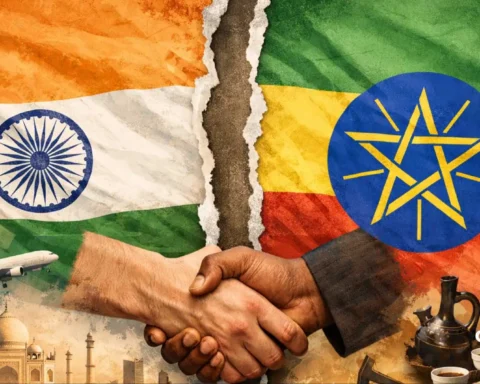In a world defined by movement and opportunity, even the wealthiest are packing their bags in search of new beginnings. Imagine private jets departing sun-drenched runways, luxury cars weaving through urban jungles, and opulent penthouses being listed in London, Mumbai, or Shanghai, as the global elite set their sights on friendlier shores. These millionaires aren’t just chasing fortune—they’re seeking the perfect blend of safety, freedom, and prosperity for themselves and their families.
From the shimmering skyscrapers of Dubai to the sun-soaked villas of southern Europe and the dynamic cities of North America, the paths of prosperity are being redrawn. Behind each departure and arrival, there are stories of ambition, innovation, and sometimes escape.
As 2025 unfolds, the great millionaire migration map is more than a tally of gains and losses; it’s a fascinating mirror reflecting the shifting tides of hope, fear, policy, and possibility in our interconnected age. Let us unpack the trend. This might change your perception of what is happening as we lay out the facts and the statistics.
Table of Contents
Global Millionaire Migration in 2025: Trends, Causes, and Implications
The world’s wealthiest individuals have always been highly mobile, seeking out destinations that offer the best combination of lifestyle benefits, tax efficiency, and economic stability. In recent years, the migration patterns of millionaires have taken on new significance, becoming a bellwether for broader economic, political, and social trends.
The image above — “Global Millionaire Migration in 2025” — provides a comprehensive snapshot of where the world’s millionaires are heading, and which countries are experiencing a net inflow or outflow of high-net-worth individuals.
The Big Winners: UAE, United States, and the Rise of Southern Europe
The United Arab Emirates (UAE) leads the way in 2025, expecting a net gain of 9,800 millionaires. This is a remarkable achievement and underscores the country’s ongoing appeal. Several factors drive this trend:
- Low Taxes: The UAE’s tax regime is known for its low rates and absence of income tax, making it especially appealing to wealthy individuals.
- Economic Openness: Business-friendly policies, minimal bureaucracy, and a robust infrastructure have made the UAE, especially Dubai and Abu Dhabi, a magnet for global entrepreneurs.
- Luxurious Lifestyle: Pristine beaches, global connectivity, and a sophisticated social scene attract not just business leaders but also celebrities and investors.
The United States follows closely, with a net increase of 7,500 millionaires. Despite political divides and economic uncertainties, the U.S. remains attractive for its vast market size, innovation hubs like Silicon Valley, and world-class education and healthcare.
Surprisingly, countries in Southern Europe such as Italy (+3,600), Switzerland (+3,000), and Portugal (+1,400) show notable gains. Their allure stems from:
- Attractive “golden visa” or residency-by-investment programs.
- High living standards, safety, and scenic environments.
- Increasing political stability and real estate investment opportunities.

Asia and the Middle East: New Destinations for the Wealthy
Saudi Arabia (+2,400) and Singapore (+1,600) are prominent beneficiaries of millionaire migration in 2025. Saudi Arabia’s ambitious Vision 2030 reforms are transforming its economy, opening up new sectors for investment. Singapore, known for its political stability, efficient governance, and status as a banking and technology hub, continues to draw Asia’s affluent families.
Other nations, such as Greece (+1,200), Canada (+1,000), and Australia (+1,000), demonstrate the global distribution of wealthy migrants beyond traditional strongholds.
The Biggest Losers: United Kingdom, China, and India
At the other end of the spectrum, the United Kingdom is projected to lose 16,500 millionaires by 2025—by far the largest net outflow globally. Several key factors are influencing this exodus:
- Uncertainty from Brexit’s long-term consequences.
- Political instability, changes in tax policy, and increasing living costs.
- Reduced appeal compared to continental Europe’s “golden visa” regimes.
China (-7,800) and India (-3,500) are the next largest net losers. In China’s case, tightening government controls, regulatory crackdowns on tech and private enterprise, and concerns about personal freedom are prompting millionaires to seek more stable and open societies. In India, issues include high taxation, unpredictable regulatory systems, and sometimes slower economic reforms, driving its wealthy to destinations like the UAE, the U.S., or Europe.
Other Notable Outflows
Countries such as South Korea (-2,400), Russia (-1,500), Brazil (-1,200), France (-800), and Spain (-500) are also witnessing notable millionaire departures. Reasons vary but often include political or economic instability, unfavorable tax treatments, or even geopolitical risks.
Factors Shaping Millionaire Migration
No two migration paths are identical—each person and family makes choices shaped by unique pressures and aspirations. Here, we examine the underlying forces that frame these decisions and the shared themes that surface.
Tax Policies and Regulations
Wealthy individuals often move to jurisdictions with more favorable tax regimes, both for personal income and capital gains. Residency and citizenship programs further enhance these incentives by offering legal residency or even passports in exchange for significant investment.
Lifestyle and Security
Personal safety, high quality of life, access to world-class healthcare and education, and political stability are major draws. Nations perceived as secure, open, and tolerant benefit most from these flows.
Economic Opportunity
Countries with strong, diverse economies and business-friendly environments are perennial favorites. For example, the U.S. and Singapore attract not only old money but also tech and startup millionaires.
Flexibility and Mobility
The ability to move, invest, and reside globally is a powerful motivator. “Second passports” and “golden visas” now form a core part of wealth management for the global elite.
Implications for Source and Destination Countries
For Source Countries: The loss of millionaires can mean reduced investment, philanthropy, and entrepreneurial dynamism. Over time, this can erode the local tax base and slow economic growth, mainly if departures stem from deeper concerns about governance or systemic risk.
For Destination Countries: An inflow of millionaires can boost real estate, luxury retail, hospitality, and financial sectors. However, it may also drive up local property prices and exacerbate inequality if not managed well.

Conclusion
The millionaire migration of 2025 is more than just a statistical shift—it’s a story of dreams in motion. From the glittering skylines of the UAE to the serene coastlines of Portugal, the movement of the wealthy is redrawing the world’s map of influence and opportunity. Where these individuals choose to live tells us as much about the changing face of nations as it does about personal ambition. For some, it’s an escape from uncertainty; for others, it’s an embrace of a brighter, more secure future. Yet, as fortunes relocate, they carry with them ideas, innovation, and investment—transforming both the lands they leave behind and the ones they call home.
In the end, millionaire migration isn’t just about wealth crossing borders; it’s about people reshaping the geography of success. And as 2025 proves, those with the means will always follow the horizon that promises the most excellent blend of security, freedom, and possibility.
We wish all migrants a promising future. The journey forward should be well-researched to avoid pitfalls. Follow us at the Global Indian Network to stay with the flow. Our upcoming articles on the pros and cons of migration—country-wise—are bound to help your quest for a better future.









